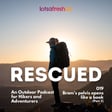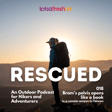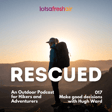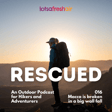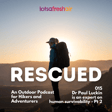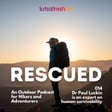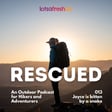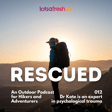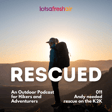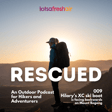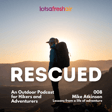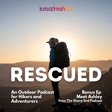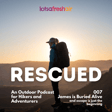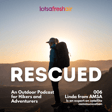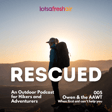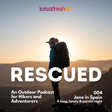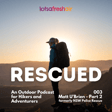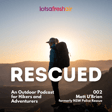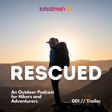Become a Creator today!Start creating today - Share your story with the world!
Start for free
00:00:00
00:00:01

010 // Zuza was struck by lightning
There’s something about the immense power of lightning that has fascinated cultures and people throughout the centuries.
How it behaves, how it moves through the sky and the force and damage that it can bring.
If news reports are anything to go by, it would be easy to think that being struck by lightning only happens to golfers or beach anglers.
My guest today is neither of those and shares her story of being struck by lightning while leading an outdoor activity on a school camp.
Checkout this resource from Outdoors NSW & ACT: https://www.outdoorsnswact.org/post/lightning-and-outdoor-activities-update
And here from Bushwalking Victoria's Bushwalking Manual.
Lessons for being around lightning:
- Current advice based on Australian Standard Lightning protection AS 1768:2021; Clause 6.4.2. is: all outdoor activities should stop once thunder is heard, or in the event of weather tracking devices, the storm is 15 kilometres away regardless of the timing of the thunder and lightning.
- Understand the previous advice of the 30:30 rule and how that has changed
- If in a group, don't stay together - spread out
- Get down from high points like ridges and knolls-be low on the landscape
- Don't shelter in overhangs or caves
- Realise that 'taking shelter' means shelter from the lightning, not the rain
- Always check forecasts
Transcript
Introduction and Theme
00:00:03
Speaker
Rescued is a podcast of conversations with rescuers and those who've been rescued. It's about the lessons we learn about ourselves, the places we go and why, without judgment or shame, to help us have better adventures, manage risk and deal with the unexpected.
Debunking Myths: Lightning Strikes
00:00:23
Speaker
You know, if news reports are anything to go by, it would be easy to think that being struck by lightning only happens to golfers or beach anglers. But my guest today is neither of those.
Zuza's Lightning Experience Begins
00:00:35
Speaker
And shares her story of being struck by lightning while leading an outdoor activity on a school camp. Zuza, it's so lovely to have you here in the Rescue Podcast. Thanks so much for joining me. Thank you, Kara. Thanks. So tell me the Zuza story. Would you describe yourself as an outdoorsy person? Yeah, I would. I'd say I spend pretty much 99% of my days outside um most of the day. And I love that lifestyle. It's either for work or for play.
00:01:05
Speaker
Think back to your childhood. When was that first memory, that connection to go ah the outdoors? and you know was it Was it a family camping trip or a hike or something else? What got you into the
Zuza's Outdoor Inclination
00:01:18
Speaker
outdoors? Yeah, so my parents didn't have a lot of money. They were immigrants to Australia. And so our holidays were outdoors. We didn't go camping, but they were always nature based. And mum loves nature. ah Dad loves rock hopping and sort of ah and doing slightly risky things. And I sort of got a little bit of both from them. So in outdoorsy childhood, you were encouraged to to spend time in wild places. Yeah, definitely. And I'm also an only child. And I think one of the ways that I would entertain myself ah was we had this pretty big reserve near my house and I would just always go for walks with my dog or alone and build my own tree house or just frolic through off track and just go exploring. And can you explain how that felt, that being in those spaces and in those places?
00:02:10
Speaker
Looking back on it with nostalgia, it gives me a lot of happiness to think about. But in the moment, I think it was just normal. It just was the way things were. And so you know you went through high school and did you go to university or what sort of did did the outdoors sort of affect the path that your life has taken?
Career Shift: Culinary to Outdoor Education
00:02:30
Speaker
At university, i I studied environmental science and conservation biology. And after having a career actually as a chef, which I also really loved, I still recreated a lot in the outdoors. And that sort of led me to this point now where I i changed my career.
00:02:48
Speaker
And now I'm an outdoor guide. Most of my work is outdoor education um directly with the school, which I absolutely love. And then I still do a little bit of Kenyan guiding and abseil guiding sort of days here and there, which I really enjoy. It's interesting you're in outdoor education now. So Did you have those connections when you were at school? Did you have those opportunities to connect to like school camps and that kind of thing? I do. Well, we had just normal school camp like once every few years, but we our school didn't have
00:03:23
Speaker
a solid outdoor education program. There was an outdoor ed subject offered like in year 10 or something. And it's so silly when you're at school how your social surroundings can affect your choices because I wanted to do it so much, but I didn't know a single person doing it. And so I chose not to do it, um which when I look back on now, I'm like, wow, that's just what teens do sometimes. Yeah. So I didn't do outdoor education at school, but I all also have like fond memories of my camps, um like rock climbing for the first time on an indoor wall was like exhilarating and just like doing drawings in nature and like your six camp. Like I remember that sort of stuff. So that definitely had
Creating Positive Memories in Nature
00:04:06
Speaker
an influence. Can you explain what it feels like when you see those lights go on and you see those moments
00:04:12
Speaker
that spark in young people that you work with. So sometimes like the like not not everyone is going to really like love nature like I do. But if I can just form little seeds of memories that are good. in nature, then that's sort of the bare minimum of like what I would like to achieve. And I think that that's actually a big thing because you carry those moments with you and you never know when they pop up again in your future and you think, oh, well, I actually really like that there are trees in the world and I'd like to the trees to stay in the world and just like promoting that um a bit of stewardship. And so sometimes, to be honest, kids don't get the spark and they don't
00:05:00
Speaker
love what they're doing and it's hard and they're hiking up that hill and it's a struggle for them. When someone else smiles because they've done something and you you you know that you've helped them, like you can't help but feel great too. What advice would you give to someone who was thinking of taking kids out or maybe it's they've got their own teens or maybe they're they've got kids who want to join Scouts and they've been asked to be a volunteer Scout leader or get involved with their kids Duke of Ed at school or something like that? What would you say to them to make their job easier, but also to maybe help?
00:05:33
Speaker
try and bring that spark ah alive. It depends on the kid. Show them a diversity of options. and Start with a bushwalk to just and a fun place, a nice place, and then let them have fun and just let them be free. um Because I think that that unstructured play will just happen. Feel relaxed, I think, in an environment is important. So you love hiking. You canyon, you climb. Have you got any other outdoor children I like to call them? Favorite children, favorite activities? Yeah, I love ski touring as well so much. so i got into that well Being from WA, we don't have much snow. I always was drawn to the snow, um but it was only until I moved to the East Coast I was like, Yes, I'm near some mountains with snow. And I didn't realize how good it is here, especially for ski touring. It's awesome. But pretty much I'll try anything. If someone offers me something in the outdoors and I've got that day free, I'll be like, oh yeah, give me something new to try. Yeah.
The Day of the Lightning Strike
00:06:38
Speaker
So take me to this day that we're going to talk about today. Where were you and what was planned? What happened from the very beginning of that day?
00:06:47
Speaker
I was actually at work. I was subcontracted to another company in the Southern Highlands. For those of us not familiar with New South Wales, tell me where the Southern Highlands are. A little bit south of Sydney, but it's still got a bit of elevation to it, a few rolling hills, maybe an hour south of Sydney also. Yeah, great, beautiful. Okay, so row rolling rural green hills. Yeah, Euclid Forest, um still really nice, ridges and spurs, sandstone country. And I was working as an abseil guide. We did have a meeting in the morning and said, oh yeah, there'll be a thunderstorm coming through at some point in the afternoon.
00:07:29
Speaker
And I went to work right at the top of a ridge where there was a little cliff line where we were doing some abseiling with the kids and we would have sort of like a rotation and ah and different groups would come just for an hour or two. So the cliff is just so we can visualize it. So how high was the abseil you were putting the kids through? I think it was only between 5 and 10 meters. It wasn't very big. It was very introductory. But you're on a ridge location. Were you kind of the highest point in the area? I must have been very high, but I wasn't right on top of this spur. I was a little bit down off the spur, but probably 10 meters of elevation at most.
00:08:19
Speaker
So still pretty high up. So the cliff line would have been below me, 10 meters. And I was working mostly at the top of this little cliff. And you're in eucalypt forest. was say Were you in forested area, like with high canopy above you? Semi-dry eucalypt forest. So not super tall, but definitely ah forested. So you've been at the briefing meeting. You've heard that there's a storm. Was there any sort of mentioned about you know it looks like you and we we can see on the on the bomb or on the radar that it's going to be pretty gnarly or just like, hey, there's a bit of a storm that will roll around in the afternoon sometime. Yeah, sort of those parts of my day now are pretty hazy. It was
00:09:03
Speaker
about four years ago. so I think we said, yeah, it's probably going to be a big storm. I can't remember though if it was a bomb, if bomb had a severe weather warning or not, or if we were aware of that. Those sort of details, I'm not sure, but definitely I do remember them saying, yeah, it could be a big storm. and you know We had a rough time that it would come in. and i I did have phone reception where where I was stationed, but I think maybe not quite enough for data or something like that at the time because I definitely remember that I wasn't able to check its location through um through a radar, which would have been really helpful, which would have been yet really useful if I had had that.
00:09:48
Speaker
as ah As an outdoor guide, for those of us who are new to this is ah as a profession, you mentioned that you know weather and risk management is is part of the job. It's part of what you do. Were you ah the lead guide on the day? or um like a two i see How does the team work? like What kind of people are up there with you? In this particular job, and there was a base ah with with people stationed there. It was quite a large group. I think there was maybe up to 300 students on that. Wow.
00:10:21
Speaker
in the era. Yeah, it was ah it was a big camp. um But I would only get maximum 15 at a time come to see in a rotation. And so there was a base camp with a few people working there who had radio comms with us. And there was two abseiling sites, myself and someone else. And that other person was not too far away. She was on the next ridge over. So I'd say 100 meters as the crow flies. That was it. And so it was sort of like my station and I would get a group of students come through and when it was their time to leave, I'd have a bit of a break, maybe 30 minutes or 40 minutes and I'd just sit and chill. So I actually had a group with me and we could start hearing some thunder in the distance. And there, yeah, that came a point where,
00:11:14
Speaker
it was necessary to stop the activity. So there is ah a rule ah in ah the industry and that's called the 30-30 rule. And it what it is is a guideline to be able to know when to stop and resume an activity in case of a thunderstorm. So if you hear ah the if you see lightning and then hear thunder and it's 30 seconds, you need to stop.
00:11:47
Speaker
the activity. So it's actually quite a long time when you think about counting to 30. So yeah, and you can resume the activity once 30 minutes has passed since that 30 second or more has occurred. So we were sort of within that, sat all the students down, took off the harnesses and tried to wait it out. But we realized that ah it wasn't really going to pass before the end of the activity. Were you waiting in in this on the same site, like on the ridge there or? Yeah, we were. So I had them separated a bit from each other. Eventually there was a big enough break that
00:12:30
Speaker
we said, all right, let's actually move away from here. And so I got them to leave. It was sort of times running out anyway, and it was probably better for them. It was like kind of a window like, oh, it's slowing down. You guys just go. So they left. And when they left, they went downhill. So that's that was very good. What's the sky looking like at this time? And how is the sky changing throughout the day if it was? It was actually surprising that it was pretty patchy from from memory. Like it was definitely...
00:13:03
Speaker
A massive storm, because I know that people even in the Blue Mountains, so over 100 kilometres away, were feeling the same storm. It was a huge cell that was coming through all the mountains. But I do remember that it wasn't completely dark and and grey. yeah Sometimes you really get clouded in with a thunderstorm and it wasn't sort of that dark grey. It was still quite light and... And rain was there or wind. Do you have any memory of that? I don't have a memory of the wind, but I remember, yeah, like a little bit of rainfall, but it wasn't too heavy yet. It's pretty dry, maybe a light drizzle. So then all the students, they left and so it's just me. I think I was expecting another group relatively shortly, but with the thunderstorm, I thought, oh, they're probably not going to be coming up here because it just kept booming. So in total,
00:13:55
Speaker
I think this storm was around for about three hours. Wow. Yeah, it was it was massive and it just stuck around. It didn't really move. It didn't just pass
Experiencing the Lightning Strike
00:14:05
Speaker
through. It's almost like it very slowly kept coming closer um rather than, yeah, like I quit passing through. I felt in the moment was just that energy was exciting. It was incredible to be hearing this deep bass roaring, clapping. it You just feel like it's so powerful in that moment.
00:14:32
Speaker
um like nature is so powerful and I was actually just so happy in that moment because it was so close but obviously I was happy because I felt safe because you don't expect that you could actually get hit and I wasn't like out in an open field I wasn't under one big tree So I guess I felt safe enough in that moment, but it did start becoming a little too close. I'd stripped my harness off of me and left it out like far from me for um for a while now because it's full of metal, the the harnesses. I was like, I'll take that off. And it started hammering down rain really, really strong.
00:15:29
Speaker
And the lightning to thunder time was starting to go from 10 seconds to six seconds to five. And that's when I was like, no, okay, I'm out. And I did what I think instinctually anyone would do, and that is to seek shelter. which I didn't have much of but there was this perfect single person sized cavelet and instinctually you see a little cave and you think I need to get in there it's hammering down with rain there's no other shelter except for my rain jacket that I was wearing and
00:16:14
Speaker
Yeah, it's like the lightning's like white around me now. um I can't see where the strikes are hitting. I can just see white. And so I'm in this little cavelet and I'm still having a great time. I'm still like, wow, it's so close. Completely feeling safe until it went from being really excited to suddenly I saw what? And I went from this crouching position in this tiny little cave to being thrown onto my back. And as soon as I opened my eyes, I was hyperventilating. Just out of, yeah, my body just was hyperventilating. And I'm on my back and I'm really confused. I can feel that I could remember and feel that there was like a pain in my left foot that I saw white and now I was on my back. And then the thought crossed my mind
00:17:13
Speaker
did i like did I just get struck that surely that's what just happened. But I didn't hear the thunder and so I think I was a bit confused. But obviously like if you get struck like I don't know I haven't spoken to anyone else that's been struck about this moment before but maybe I can't hear the thunder because it's me like it's on me you know and the thunder comes later. So um or it was just this wide out moment um in my mind or blackout moment but it was white and so I'm on my back and hyperventilating then I realized I've been struck and so my next reaction was to start like touching my head touching my body touching my knees like it's like my my brain was going yep you're here yep oh my god I'm I'm here and I'm okay
00:18:02
Speaker
Am I okay? Like, I think I'm okay. And I just kept checking in. I was okay. I could swear I could smell something burning. and So I was like checking my hair. Where's my hair in fire? No, it's fine. That's okay. And then I was like, my foot, my left foot was the last thing to leave the ground. And then I think I've seen pictures before of people that get struck by lightning and they have these incredible, I'm sure very painful, but incredible markings on them. And I was like, maybe that my foot's going to have that. So I took my shoe off and had a look and it was fine. I was completely fine.
00:18:41
Speaker
And all this time that I'm checking myself and doing this, it is still hammering down. And the thunder and the lightning is right on top of me. It's like, it's not moving. It's a slow song. So there's this intense energy still happening. It's not over. And suddenly, instead of being excited, now I'm... pretty scared. um And I'm terrified. And every time I hear that thunder, I'm like, I'm just so scared. And I just, I just stayed there. I didn't, yeah, I didn't move. I didn't want to, I had my phone in my hand before and I didn't want to touch my phone. I like threw it like a little bit away from me and I was like, what if the phone conducted it? I just didn't know.
00:19:21
Speaker
And I lay there for a solid hour, just not doing anything, but just laying there and waiting for this storm to pass. That's how long it was so close to me. And um yeah, even maybe after an hour is like a 10 second sort of difference between the lightning and the thunder. That's incredible. So the hour that you're lying there, can you remember what you were thinking? Like what was going through your head? Um, I think it's one of those strange moments where time has very little meaning.
Post-Strike Reflections and Reality Check
00:19:58
Speaker
It's just, it's long but short. Um, yeah, it didn't really have much of a meaning. I didn't want to look at my phone, so I didn't really know what the time was.
00:20:07
Speaker
I was still hyperventilating for a little bit and then it slowed down but my heart was racing for quite ah quite a while. um So I must have had a lot of adrenaline as well which also can interfere with like how you perceive time. um I just ah just waited. yeah So you checked your foot. There was no none of those those patterns that you talked about. Your heart was racing. You were lying on your back. Was there any other symptoms? like where you feel Did you have a headache or any pain anywhere in your body or tingling? You smelt something or you thought you smelt something?
00:20:43
Speaker
Yeah, so besides feeling like I'd smell something burning, which I don't know if it was or if it was a phantom smell, um because it passed relatively quickly, kind of like a candle burning out, like it was quite quite quick. And for so the foot, so felt like I'd had ah had a little bit of tingling pain still in the foot. Not pain, just this tingling sensation, but eventually that passed. So besides those two things, I was just completely fine. Nothing, nothing wrong. Completely fine. And that made it interesting because it just was so surreal. I didn't, I still couldn't believe that it, what was, what had happened. I said it to myself, like, I think I got struck, but it was definitely, I think it was really surreal state being.
00:21:36
Speaker
Massive thanks for the support from the team at Patti Pallon, who since 1930 have been leaders in travel and outdoor adventure. In fact, did you know that Patti himself, a member of the Sydney Bushwalkers Club, was a volunteer in the original search and rescue arm of the Federation of Bushwalking Clubs in New South Wales? Huh, nice one Patti. And so you throw your phone away and you'd said that you had radio comms, but I guess the radio is something metal. And if you've still got this storm,
00:22:09
Speaker
like at At what point did you or did you pick up the radio and try to actually contact your colleagues and what happened? so Probably after it started to pass a little bit, like when I felt like yeah it's it's left, it's gone, or it's going, um it's not over me anymore. That's about an hour. stopped raining or not raining much and I went outside and outside this little cave load and I looked around. ah The first thing I did actually was probably tried to get on radio and I didn't get a response. So then I left it and then I tried again after a while and I didn't get any response. So I was like, all right, well, it's not working.
00:22:51
Speaker
for whatever reason. And then I grabbed my phone and I was like, yeah that need of like, I need to talk to someone because I'm alone right now and I've had this experience and it's been a while of being alone and I need to talk to someone. So the first thing I did was call my partner. Who's was in the Blue Mountains and it rang out it went to message I was like, okay, and then I tried to call a friend and the same thing it rang out and Went to message bank and then I had the strangest Thought that I 100% was seriously thinking for a split second Because I couldn't contact anyone on radio and because I couldn't contact anyone on my phone. I Had this split-second thought
00:23:37
Speaker
Maybe I am dead. And this is my brain. This is what happens, that your brain tries to recreate your last moments, which it's able to to do with my surroundings, but I can't talk to people. And then I was like, and then I shook it up and i was like, no, no, I am alive. But I, for a split second, I honestly believed that that was a possibility. I was like, maybe I am dead. So, yeah. That was a surreal, really surreal after effect. Like a Stephen King novel kind of thought. I can't even imagine what is going through your head, like apart from the split thought that that might be your reality. Do you have words to describe the space, the mental space that you were in, in that little cavelet at that time?
00:24:31
Speaker
Yeah, I was still a little bit sort of elevated, I'd say, sort of a little bit hyper in my my body and my mind. It was definitely not my normal state of consciousness. It was slightly like sort of elevated. So your phone has rung out. You've got message bank. Is the storm still? The storm now is definitely passing, passed. And no one's arrived for their abseil. So I'm like, I can't contact anyone in cons. I thought, well, I might just go for a little walk and I'll go to this other guide and see if they're okay.
00:25:16
Speaker
And did your body feel normal at that point? Like you'd pack picked up your your harness with all the metal bits hanging off it, and did you pack up your station? No, I left my harness. I just stayed there. I left everything. I just went for a wander. And I definitely had calmed down enough that I felt like I could i could do that, that I could like walk away from this. Because you sort of don't want to leave, even though it was a place of danger a moment ago. you like It's the place that you know. And I hadn't actually been to the other site before. I had to sort of go and walk. into the bush and sort of fine ah follow the ridges and find her. But yeah, I felt okay enough to to do that. And like I said, I started actually kind of being a bit confused. Like, did I really did that really happen? Like I didn't, not like no, one it's like no one saw it. It's something that I felt. And so it was easy ah to question that because how could I have been struck? Like it was also so surreal and so weird that that could have happened. um But yeah, I felt all right to walk over.
00:26:17
Speaker
And I definitely wanted to talk to someone and I wanted to see if she was okay, because it was gnarly storm. So I found her and she was chilling. She was happy. She was just chilling, reading a book. And I was like, I don't know, I was like, oh, you're right. But in my head, I'm like, what do I say? And then eventually I was like, do I say it? Like, yeah. And I was like, okay, I'll say it. I was like, I think I got struck by lightning. And then she looked at me and she said,
00:26:48
Speaker
Oh, I saw a strike hit your ridge. And I was like, it didn't just hit my ridge, it hit me. And i and that's when it confirmed it, because she had view of of the next spur over, which is where I was, and she saw that lightning hit the top. um So yeah, that was that extra confirmation of like, yeah, that that is actually what happened. But I was standing there, talking normally, and So that was probably still pretty surreal for her as well. Unbelievable. So what what did you know before this time of you know what happens in the bush or what you should do if there's a storm? you know How do you avoid it? what what What kind of stuff did you know through training?
Safety Insights and Learnings
00:27:36
Speaker
And you don't be at the very top of anything. Don't be out in the open. Don't be under ah like trees, but mostly like a singular tree somewhere in a field. like It's really bad. If you are caught, then sort of squat down and have your heels together or stand on something insulating. And you mentioned that you that when the group was still with you, the kids, you'd spread them out. You made them spread out? Yeah. So spreading a group out rather than having everyone together because you can anyone could be a conductor and then pass that lining on to someone else. Yeah.
00:28:12
Speaker
And, you know, we do have, I don't know, maybe training's not the right word, but we do have, um we we talk about these things when we do our you course st to become the guides. It's still, you feel like it's still such an unlikely thing to happen. As long as you do those things, you'll be fine. And I kind of did all those things, but I did do some things wrong. And I've learned a lot through it now, the experience. So one of the the big things that I've i've learned not to do is to go into little caves. And that reason is, I don't know if this is in every case, but I think definitely the ironstone that exists within our sandstone probably doesn't help or probably helps too much with ah kind conducting um through the ground. So for instance, what what probably happened in my case is that the lightning hit the top of the ridge.
00:29:05
Speaker
And then it moved to the ground. It got to the end of, let's say, the top of my little cave and it has nowhere to go. So then it just moves down and it has to hit the ground. And so I was standing in the way and that's what can happen to you if you're in a small cave seeking shelter, is it can actually move through you um because it has nowhere else to go. So you've walked across to the other ridge. You've met up with your colleague. You've shared what's happened to you. who What happens next? I mean, do do you go to the doctor? Do you get yourself checked out? Do you go to hospital? How's your body feeling? How's your mind feeling? Felt completely fine. I got really, really, really lucky.
00:29:56
Speaker
And I must have gotten such a small jolt that I was completely okay. It was still big enough to lift me off my foot, like in a crouching, business I went from crouching to on my back. Like I jumped, like it still did that to me. But besides that, I was completely fine. And I did not go to the doctor. And maybe I should have. But when you feel completely fine, you just don't, I'm like, well, what's the doctor going to, like, well, how are they, what ah what tests are they going to do on me to like, yes, you've had electricity run through. Like I was fine. And so, you know, definitely like if I felt something over a few days, I would have been checked out, but I was fine. And, um, it probably is a good idea to just, just go to the doctor and just have it checked up. But, um, yeah, I didn't.
00:30:55
Speaker
Do you have a personal story about an incident or time during an outdoor trip when something didn't quite go to plan? Maybe you got lost, injured, let down by some gear or something else. Look, honestly, it can happen to any of us at any time, regardless of how experienced we are. And it's by sharing these stories that we can all learn and help avoid them in the future. If that's you, I'd love to hear from you. So please drop me an email to rescued at lotsafreshair.com. That's L-O-T-S-A, freshair.com. So how do you feel? How do you reflect about storms now?
New Perspective on Storms and Safety
00:31:36
Speaker
I've started to become more comfortable with them and maybe like less fearful, but more knowledgeable ah and more, I take it, take them a lot more seriously, but for, yeah, probably a good three years, I would feel I would get that sort of, um, that trauma response from a thunderstorm from once loving them to being really, really scared when I was out. But now I can. still appreciate them, even if I'm caught out in a storm. But I'm a lot more, yeah, they don't necessarily excite me in the same way that I felt on the day before I got struck. But I'm not completely getting that trauma response. And just time seems to help that for me.
00:32:22
Speaker
What's changed for you do you think as a result? like Like when you're prepping to go out on a trip so you know we've all got whether it be for recreation or it's for work or you know something we've got a usually got a bit of a checklist or a plan of things that we do you know we might check the weather. do Has anything in that regard changed for you, the way you, um like you said, you actually have gone and learnt some more about about whether or you feel differently in terms of how you look at forecasts or um you look at radars a bit differently. Does that sort of play to your mind at all? Yeah, I think I'm just like, have another layer of cautiousness on me than maybe
00:33:05
Speaker
ah some people around me might might have because I've had that experience and i can I just know that it can happen and just how powerful thunderstorms are in many ways, both in in their sort of flash flood setting through canyons, but also through the the the lightning setting. And so I think I have just maybe that next added layer of sort of risk aversion to them, then maybe someone else might. It's not to say like feeling like I ever felt blasé about them, but
00:33:43
Speaker
I definitely just am a lot more serious if it's forecast or if I'm caught out in one. And you're not a golfer and you're not a beachfisher person? No. There's a great page through through Outdoors New South Wales. It can be sort of ah found of a really great ah American study and recommendations page. and And they have a lot of really good information about thunderstorms. And they say that 50% of all people, all deaths caused by lightning, 50%.
00:34:19
Speaker
is in the category of outdoor recreation. So people who are recreating outdoors. So it's quite a lot. And I think yeah know as as a guide and also as a person who just loves the outdoors, when you're out in them all the time, you are increasing your risk. And it feels like it's just like one in a million thing. But um one of the stats, I guess, do you know? I don't know if you've looked at the numbers, but do you know How many people in Australia die of lightning strikes? I do not know. Yeah, it's between like six and ten. A year. A year in Australia. That's more than sharks. And the other one on top of the the deaths is like the injuries. Over 100 serious injuries.
00:35:09
Speaker
And then there's all the unreported lightning strike. It's not reported. like there's no I don't know if there is, but like you you don't feel like you have to report a lightning strike. And so there's actually quite a lot, really, when you think about it. Yeah. So did you find that as a result of this, and you said you know you had these trauma reactions for a few years afterwards, and it's it's slowly, you know you're still working through some of that. but Did you find that you had this curiosity too after it? You wanted to go and find out more and find out some stats and find out other things. Did you learn some more that would be helpful for us about about lightning and what what other behaviours we can do apart from you know that the separation and the crouching and getting off the high point? I shared my story through like my socials and
00:35:59
Speaker
had two friends reach out and say, I've also been struck. So that made me realize, oh wow, like it's definitely not an isolated experience. So that was that was interesting just through that experience to learn about people I knew that had been struck. And like then you think, oh, how many other stories are there out there of people in this industry or in the outdoors? Yeah, some of the learnings that I had were like I definitely learned a bit more about lightning and about the different types of strikes that can happen um because you get a direct strike um or like a side strike, which is maybe what I had um where like, but that's the classic one would be it hits a tree.
00:36:44
Speaker
and then it bounces off the tree. The tree is a conductor and then it comes to you, ah which can kill as well and causes, I think, um like a majority of deaths. And then you've got ground strikes. So yeah, just standing on the ground and conducting through the ground and then coming up to you. So I think, and that one's also like very, very um the most common for people. but Once a direct strike is actually very uncommon to get just get hit by a lining bolt is just very uncommon in comparison to the other two. And also the thing that confused me the most was eye, seat, shelter. That's what I did. And I did it in a very instinctual way. There's a little cave. I'm going to go into that little cave.
00:37:28
Speaker
And I guess what I learnt through talking to people actually in the industry that just have been in it a lot longer is don't do that. Don't go into little caves because it's actually more dangerous. Being out in the open is potentially safer. But the most important thing that I really should have done, the the biggest takeaway is I should have just walked downhill. That's all I needed to do. Just go downhill. I guess I didn't really feel like I'm not right at the top and there's a big forest here. But yeah, just if in doubt, just walk downhill.
00:38:05
Speaker
I love how simple it is too. but But like you said, you know, it's so instinctual and I know I've done it too. So this is really good learnings for all of us. Yeah. For all of us for sure. Yeah, definitely. And how do you feel now? So you said it's four years ago. um Like are you reminded of this experience when you go out now or is it only when you, you know, maybe hear a storm or see big clouds gathering? Because I got so lucky, i despite like yeah those those moments when i'd have um in when I'm in a thunderstorm for a few years, feeling that sort of that like trauma feeling coming up, um anxiousness the and fear, like just pure fear. like I just don't want to be here.
00:38:52
Speaker
um Besides that coming up, which has definitely just passed with time, I, yeah, I don't look back on it.
Sharing the Experience and Educating Others
00:39:03
Speaker
It kind of feels like I now have this story under my belt. I'm just lucky. I was extremely lucky because it was completely fine. I didn't sustain any injuries as far as I know. And so what I'm left with is a story. just taking storms a lot more seriously, both in work and my play. Is there anything else you wanted to say before you wrap up, closing thoughts that you'd you'd love to leave us with? I've definitely been in situations with with friends, say walking out of a canyon, up on a ridge and a thunderstorm's coming through classic summertime like late summer or summertime pattern.
00:39:44
Speaker
and friends, and this is actually before I got struck and friends have been a bit blase about it, like, oh, it's fine. I'm like, oh, maybe we should just like stop for a moment. Like, no, it's fine. Now, if I'm in that kind of situation again, I think I'd just be very assertive. and be like, no, there's no way. I'm not moving and you guys aren't moving. And I would just sort of actually be that I would take control. And I always have the card to play like, I got struck guys, so you got to listen to me. yeah Because I did get struck and went on moving or we're moving downhill or whatever we need to do. So I think
00:40:19
Speaker
I've probably developed that more assertiveness of I know what to do now and I know why because and I know it can happen because I'm living proof that it can happen and I just got really lucky. So I think that that is something that has changed me for the better. And now all of us can do that too. We can say, wait, hang on. I know someone. I heard this story from Zuzah and she got struck and it's much more common than you think. And what did you say? 50% of the people who get struck are people who are out in the outdoors recreating. yeah
00:40:53
Speaker
We are some of those people, so yeah. So Zuzia, thank you so much for sharing your story. um It's powerful, powerful stuff. And I think sometimes it takes a lot of guts to share a story, especially when you know that you've had things that you've changed and you've learned through it as well. So yeah, I really honour it and thank you for that. So cheers to you. Thanks, Garrow. If you've enjoyed this powerful story, or one of the many others from my super generous guests, you can help more people connect and hear these valuable lessons simply by leaving a five star review. And why not even click that little bitty share button on your podcast app and help your outdoorsy mates find it too.
00:41:38
Speaker
The rescued podcast is produced on the unceded lands of the Gondunga people of the Blue Mountains of New South Wales. I pay my respects to the elders past and present and acknowledge their enduring connection to and care for country. Special thanks to our sponsors Patti Pallen. This has been a lots of fresh air production.
